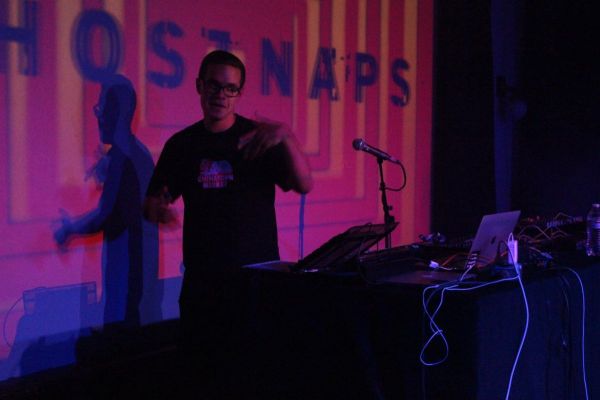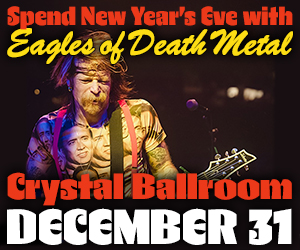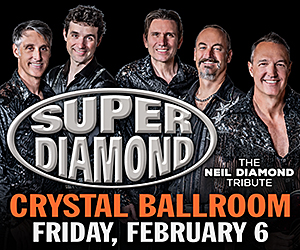Home > News
01/04/2021
Staying afloat without live shows: How Eugene musicians adapted to COVID-19
By GAVIN MAJESKI // Eugene Musicians have been live-streaming, woodshedding building or and dreaming of a day when musicians and audiences can be reunited in the same room.
Sporting khaki shorts and a button-up t-shirt covered in white bedsheet ghosts, Richard Lathrop, better known by his stage name Ghostnaps, sits in a lawn chair in a tall grass field holding his laptop and MIDI pad.
As he presses a button on his computer, Lathrop’s remix of “Rushing Back” by Flume begins playing. Lathrop sets down his music and picks up a white board and marker. He begins writing, as the text, “Virtual Valley what’s good!” appears in black font in the top left corner of the screen.
Lathrop is recording his set list for the Virtual Valley Music Festival that was held on June 27 of last year over the live streaming platform Twitch.tv. Lathrop, who spearheaded the virtual concert, gathered a total of 23 local Eugene, Oregon artists that each recorded their own individual sets. Each set was then sent to Lathrop to form a package that was played at the desired time.
Virtual Valley Music Festival went off without a hitch, as the event raised $2,407.64 after fees, which was then split evenly to benefit both Oregon Food Bank and Black Lives Matter.
A month prior, Lathrop held Covchella, his first attempt at a virtual concert since the COVID-19 pandemic started last year. For a first attempt, Lathrop raised a whopping $1,334.28 for FOOD For Lane County, a nonprofit which distributes food to locals in need.
While Lathrop saw only increased numbers with each of his livestreamed events, the effort required to put on these shows and the overall declining interest in virtual concerts has had a negative impact on smaller musicians.
When the pandemic began to worsen in Spring of last year, artists took to using platforms such as Twitch, Facebook Live, Instagram Live and YouTube Live in order to perform shows that were available for a cheaper cost than the average live event, or sometimes completely free in Lathrop’s case.
Viewership within the “Music” category on Twitch peaked during May 2020 at 35,000 viewers a day and has since declined, plateauing around 28,000 as of Dec. according to third-party statistical analysis site Twitch Tracker.
And while famous musicians such as T-Pain and hip-hop producer Kenny Beats have only grown in popularity due to their regular streaming schedules on Twitch, small artists such as Lathrop don’t have the advantage of having a well-known fanbase. This creates a severe issue when live shows played such an integral part of exposing new listeners to their music.
During a recent Zoom interview with Lathrop, he stressed just how important the house show scene was. “The house shows were just so important for getting that audience and maintaining it,” Lathrop said.
“You saw so many acts in the past year, in Eugene even, that broke out playing house shows. It’s really sad because you’re not going to see as many smaller bands get big really fast.”
Lathrop also brought up how the global ticket sales company Ticketmaster recently announced plans to check individual vaccine statuses before distributing tickets to consumers.
'“People aren’t going to want a bunch of strangers in their houses because when you’re at a house show you can’t screen people like Ticketmaster plans to,” Lathrop said.
For musicians who aren't students and are trying to make music their full-time job, this lack of income from live shows can have a serious effect. A 2018 study conducted by the Music Industry Research Association found that 80.8% of income gained from musicians comes from live events.
And while streaming seems like an easy option to fill the void that is performing live, factors such as equipment costs and rebranding on a new platform can make livestreaming feel exclusive to only those that have the additional time and money to invest.
This is another reason why Lathrop decided to make sure the events he threw were going to benefit charity and consist of a wide variety of acts to draw more attention. One of the already popular Eugene acts was electronic music producer Kelly Gehlen, also known as DJ Kellalit.
“When it comes to promoting music, live shows were everything,” Gehlen said.
"A lot of the time the people were there for a different band, but you were coming up next. They’d watch you and you’d gain their following and now know who you are and start coming to your shows. It was live promotion, but since in-person house shows are no more, it’s near impossible to find new fans.”
While Gehlen said she believes the disappearance of live shows will make it much harder to create a bigger fanbase, she has personally experienced at least one of the added benefits that comes from self-isolation.
“Honestly, I’ve never made so much music before,” said Gehlen.
“Since the pandemic, I’m locked in my room and since I moved to a new city [Los Angeles], I don’t know anybody. There’s no excuse for me to go out, there’s no one for me to hang out with, so I just sit in my room and work on music all day and all night. It’s honestly a blessing in disguise.”
Both Gehlen and Lathrop have started to prioritize social media branding and advertisements to supplement publicity gained through live shows. This can be costly according to Lathrop, who uses Instagram to promote his music via minimal advertisements.
But with promising results from the recent COVID-19 vaccine, there may be hope for venues to open if procedures are implemented to reduce possible exposure.
One such venue is WOW Hall, located in downtown Eugene. WOW Hall has been a staple music venue for years, hosting the likes of BROCKHAMPTON, Car Seat Headrest and Mount Eerie. In May of last year, WOW Hall hosted the livestream event, WOW! What a Stream!, which featured 26 artists, including L.A. based group The Mowgli’s as the headliner.
WOW Hall volunteer and University of Oregon student Gabriel Gonzaga-Valenzuela said he is excited for the establishment's future plans after wrapping up the venue’s second show that was held on Dec. 29.
“It seems like the real key in music and fan engagement is consistency. So you’re seeing people that are doing something every day or weekly and they’ve grown a fan base over the last eight months, whereas if you do a one-off thing it’s a lot harder.”
The last WOW Hall Twitch stream was in celebration of the venue’s 45th anniversary, and featured compilation footage from 17 of the staff member’s favorite artists that have played over the years.
With uncertainty in the live music industry until a COVID-19 vaccine has been mass produced and distributed, methods such as livestreaming and advertisement are hopeful possibilities when it comes to carrying the torch for promoting smaller artists.








